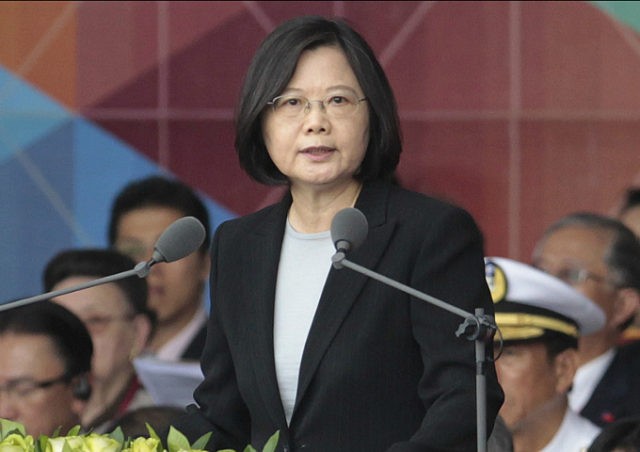Taiwan is organizing a Western Hemisphere visit for President Tsai Ing-wen and hinting at a quick stop in the United States, appearing to alarm Chinese officials already concerned that Tsai has inspired too much of a positive response from the incoming Trump administration.
Tsai, who won the nation’s presidency representing the pro-independence Democratic Progressive Party (DPP), is planning to visit Honduras, Nicaragua, Guatemala, and El Salvador in January. Her office has not confirmed whether she would stop in the United States on her way south, though it appears that this is a possibility. At the very least, the South China Morning Post reports, her office has rejected the idea that pressure from Beijing would keep her from visiting America.
“That is over-speculation, there is no problem of that kind,” presidential spokesman Alex Huang said, refusing to confirm whether Tsai would stop there. The UK Guardian claimed on Thursday, however, that Tsai is “planning to meet members of Congress next month during a stopover visit to the US,” citing “a senior Taiwanese official.”
“The US normally does not host Taiwan presidents owing to Washington’s maintenance of the one-China policy,” the Morning Post notes.
While Tsai will not be part of the audience for President-elect Donald Trump’s inauguration, she is sending a message of sovereignty with the delegation chosen to attend. Leading them will be former DPP leader Yu Shyi-kun, who has been strongly critical of America’s acceptance of the “One China” policy.
Also critical of the “One China” policy: Donald Trump, who accepted a phone call from Tsai as a fellow head of state following his election. “I fully understand the ‘one China’ policy, but I don’t know why we have to be bound by a ‘one China’ policy unless we make a deal with China having to do with other things, including trade,” Trump said following his conversation with Tsai.
The Chinese Foreign Ministry responded with “serious concern” for Trump and a warning that “Adhering to the ‘one China’ principle is the political bedrock for the development US-China relations. If it is comprised or disrupted, the sound and steady growth of the bilateral relationship, as well as bilateral cooperation in major fields would be out of question.”
Tsai’s trip West follows a week in which China appears to have successfully convinced at least one nation, Sao Tome and Principe, to sever ties with Taiwan, no longer acknowledging its sovereignty. Currently, 21 states, 12 in Latin America, recognize Taiwan as its own country, as a reporter noted to Chinese Foreign Ministry spokeswoman Hua Chunying on Wednesday. The United States does not recognize Taiwan, instead accepting Beijing’s “One China” policy, which rejects any independence movements that the Communist government does not recognize.
In noting the countries who acknowledge Taiwan to Hua, the reporter asked whether China was involved in convincing the Latin American nations in question to rescind their diplomatic ties. “The one-China principle is the prerequisite and political foundation for China to maintain and develop friendly and cooperative relations with other countries in the world,” she replied. “It has become the common aspiration of the international community and the trend of the times to adhere to the one-China principle. China is ready to develop friendly and cooperative relations with all countries on the basis of the Five Principles of Peaceful Co-existence and the one-China principle.”
Hua said China “welcomed Sao Tome and Principe back onto the correct path of the one-China principle.”
Tsai, meanwhile, rejected the African nation’s move and accused China of bullying poorer countries into disregarding Taiwan’s existence. “[Beijing’s] diplomatic suppression is not aimed at a particular party, but all Taiwanese as a whole,” a statement on Tsai’s Facebook read. “Such conduct will not help the long-term development of cross-strait relations. Deliberately ignoring and dwarfing Taiwan in the international arena will only make Taiwanese feel humiliated and infuriated.”

COMMENTS
Please let us know if you're having issues with commenting.